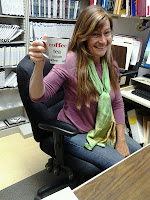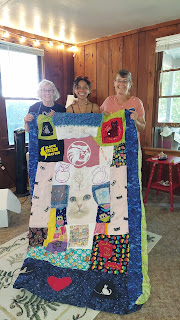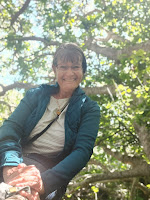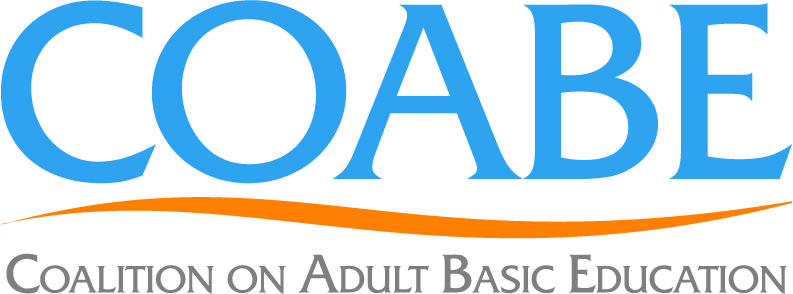In California, the bulk of funding for Adult Education - especially for Adult Schools - is through the state. Only a relatively small portion of funding is from federal sources. In many other states, the reverse is true. What happens on the federal level determines funding realities for Adult Ed in many parts of the US and influences policy for Adult Ed in every state. This letter - written by John Mears in conversation with many others - is an important summary of why it is so important that Adult Ed be seen, valued, and funded.
About Mr. Mears: John Mears has taught ESL to adult immigrants for Los Angeles Unified School District for more than 35 years. He has advocated for adult education with the California Council for Adult Education (CCAE) and United Teachers Los Angeles (UTLA). This letter was a joint effort, with the generous help of many professional educators and advocates, as well as adult learners, throughout the USA.
April 26, 2021
The
Honorable Joseph R. Biden
President
The White
House
1600
Pennsylvania Avenue NW
Washington,
DC 20500
Dear Mr.
President:
Thank you for leading the fight
against the pandemic with a vigorous national strategy. Now we need an equally vigorous
national strategy to address an ongoing systemic failure that has been long in
the making: increasing numbers of under-educated adults.
We, the undersigned, are educators who
have dedicated our lives to meeting the lifelong learning needs of adults nationwide.
Our group also includes adult students who have benefited from adult education
programs. We are delighted to see that your American Jobs Plan “will better
tailor services to workers’ job seeking and career development needs through
investments in Expanded Career Services and the (Workforce Investment and
Opportunities Act) Title II adult literacy program.” However, we want to ensure
that all U.S. adults who need foundational skills -- including
immigrants, regardless of their ability to work -- will be served.
In
the United States, 19% of adults are profoundly in need of literacy skills
development and 29% lack critical numeracy skills. These adults are
overrepresented in communities of color—the same communities that have been
most adversely affected by the COVID-induced health and economic challenges
that are rooted in systemic inequity. They are also especially vulnerable to the
COVID pandemic, as low-skilled adults are often first out of the job market and
last back in during times of economic crisis. A recent U.S. Bureau of Labor
Statistics analysis indicates that anticipated job growth for those with a high
school diploma or less is 0% to -2.3%, while all other education levels show
positive growth.
The lack of skilled, well-trained
workers in our nation caused nearly 7 million jobs to be unfilled in the U.S.,
even before the pandemic, according to the Labor Department. Now, as the
economy is rebounding, the unmet need for sufficiently trained and literate
workers is even greater. U.S. industry and business leaders have been sounding
the alarm about this problem since the 1990s -- yet opportunities for adults to
get basic education and job training have eroded substantially in the past
dozen years. These deficiencies cripple our economy, our competitiveness on the
world stage, and efforts to “Build Back Better.”
Your ambitious goals of
naturalizing immigrants bring additional challenges. Millions of immigrants
need to learn English as a Second Language (ESL), U.S. history and
government, and get on the path to U.S. citizenship. This group already
represents at least half of adult learners and will almost certainly grow in the
near future.
Nationwide, many states and
communities already offer adult basic (or foundational) skills education
programs; but since the 2008 recession, many of these programs have been
drastically curtailed or eliminated due to budget cuts. Surviving programs have
increasingly relied on federal tax dollars through WIOA – the Workforce
Innovation and Opportunity Act -- and matching state and local funds, which may
also be cut.
The COVID-19 pandemic has further
eroded adult education programs by forcing most instruction online, through
virtual education platforms. Although online instruction presents daunting
challenges, especially for the economically disadvantaged, it also offers
exciting opportunities for educational programs that can be offered
nationwide.
Especially given the educational
challenges that come with your ambitious plans for immigration reform, we
propose the following:
·
Increased funding overall. At current levels of funding, adult education programs are able to
serve under 3% of the adults who could benefit from their programs.
Furthermore, in the next five years, adult education programs are expecting a
significant surge in participation, like the surge that happened following
the last economic downturn. Steady yet significant increases in funding over
the next five years will allow programs to build the capacity they need to
address the increased demand. We support Senator Reed's request for $1
billion in initial aid through pandemic response funding and a doubling of the
annual appropriation for the Adult Education and Family Literacy Act state
grant program (Title 2 of WIOA) over the next five years, beginning with
an $810 million appropriation for FY 22.
·
More free or low-fee lifelong
learning opportunities -- available both in-person and online
nationwide. Adult Education and Literacy, as adult foundational skills are
referred to in the WIOA legislation, should include: adult basic education,
including adult basic literacy; all levels of English language learning instruction
and U.S. citizenship test preparation for immigrants and refugees (ESL or
ESOL); digital literacy skills; adult high school diploma programs; high school
equivalency preparation programs; and other important educational services for
adults such as older adult programs, workplace basic skills, and family or
intergenerational literacy programs). We also believe that occupational
training, including Integrated Education and Training, especially for new
“green jobs” (wind energy, solar, etc.) is important. If offered online,
these programs could be accessed anywhere in the USA. However, in-person
instruction is generally preferable, especially for the economically and
technologically disadvantaged, and it should be expanded and offered through a
wide range of organizations and institutions: district K-12 school systems,
community colleges, community-based organizations, public libraries,
faith-based organizations, correctional institutions, etc.
- A new “amnesty” program for immigrants. In
the late 1980s, many adult education programs in the USA mobilized to
facilitate President Reagan’s amnesty program (the Immigration Reform
and Control Act) by gearing up quickly to offer classes in ESL and
citizenship to many thousands of immigrants who are now proud U.S.
citizens. We believe that a similar program would admirably serve
our nation’s economy and civil society, and reward millions of honest,
hard-working but undocumented immigrants with
well-deserved security.
·
Coordination of funding among local and
national educational systems, so that federally funded programs, state-funded
programs and community-based groups can function more effectively
together. Components of these systems would include, among others:
learning management systems; shared databases; professional development systems
for everybody (not just funded programs); common assessments for common data;
etc.
·
Community and family focus. Educating
parents has a profound ripple effect throughout families and communities.
Critics of adult education say we should “just focus on the kids,” but parents’
educational levels correlate with their children’s success in school. Los
Angeles Unified School District has community adult schools that provide hubs
of learning for children and parents alike. Where possible, they offer
childcare to facilitate parents’ education. This approach is already working
well in other adult education programs across the country.
·
Senator Reed
(D-RI) and Senator Young (R-IN) have introduced the Strengthening Research
in Adult Education Act (S. 1126). We enthusiastically support this
bipartisan bill and urge your administration to support it as well.
As adult educators, as lifelong
learners, and as advocates, we -- and thousands of our colleagues -- would be
delighted to work with your administration to develop new and expanded
educational programs for adults nationwide.
The stakes are high, the need is
great, and the time is now.
Sincerely,
John Mears
ESL teacher, West Valley Occupational Center
LAUSD Division of Adult and Career Education
Los Angeles, CA
Sharon Bonney
CEO, Coalition on Adult Basic Education
Cicero, NY
Deborah Kennedy
Executive Director, National Coalition for Literacy
Washington, DC
Michele Diecuch
Senior Director of Programs, ProLiteracy
Syracuse, NY
Federico Salas-Isnardi
Director, Mayor’s Office for Adult Literacy
Houston, TX
Silja Kallenbach
Vice President, World
Education, Inc.
Boston, MA
Ira Yankwitt
Executive Director, Literacy
Assistance Center
New York, NY
David J. Rosen
President, Newsome Associates
Co-founder and Steering Committee Member, Open Door
Collective
Board Member, ProLiteracy
Boston, Massachusetts
Rosa Aronson, PhD
Interim Executive Director, TESOL
International Association
Alexandria, VA
Marty Finsterbusch
Executive
Director, Voice of Adult Learners United for Education (VALUEUSA)
Media, PA
Cynthia Eagleton
ESL Teacher, San Mateo Adult School
CFT Local 4681
San Mateo, CA
Kristen
Pursley
Adult
School Teacher, West Contra Costa Adult Education
Contra
Costa County, CA
Christine Ramirez,
President, California Council for Adult Education/Los
Angeles Metropolitan Section
Los Angeles, CA
Sean Abajian
Principal, El Rancho Adult Education Center
Pico Rivera, CA
Dr. Carolyn Quetzal
Instructional Technology Teacher Advisor, LAUSD
Diversity, Inclusion, and Educational Equity Advocate
Los Angeles, CA
Veronica
Montes
Director,
School & Family Support Services
Culver City
Unified School District
Culver
City, CA
Dr. Janet Eyring
Emerita Professor of TESOL
California State University, Fullerton
Fullerton,
CA
Dr. Vanessa Wenzell
Emerita Professor of TESOL
California State University, Dominguez Hills
Dominguez
Hills, CA
Dr. Cherry Campbell
Academic Director (ret.), American Language Institute
San Diego State University
San Diego, CA
Wendy B. Smith, Ph.D.
Professor Emerita, Department
of English
California State University,
San Bernardino
San Bernardino, CA
Dr. Ann Snow
Professor of Education/TESOL
Chair, Division of Applied and
Advanced Studies in Education
California State University, Los Angeles
Los Angeles, CA
Jean Wong,
Ph.D.
Associate
Professor, The College of New Jersey
Dept. of
Special Education, Language & Literacy
Ewing, NJ
Donna M.
Brinton
Lecturer/Academic
Coordinator (ret.), Department of Applied Linguistics & TESL
UCLA ESL
Service Courses
Los
Angeles, CA
Sabrina
Peck
Professor
Emerita, Linguistics/TESL
California
State University Northridge
Northridge,
CA
Juan Carlos Gallego
Professor of TESOL and Spanish, California State University,
Fullerton
Fullerton,
CA
Paula
Rainey
Managing
Director, The English School at Lawrence Road Presbyterian Church
Lawrenceville,
NJ
Marina
Kravtsova
Alumna of
San Mateo Adult School
San Mateo
Adult School English Learner Specialist
Advisor to
Student Council and Student Ambassadors
Volunteer
Coordinator
Former
Member of California AB86 Workgroup
San Mateo,
CA
Shara Watkins
Trustee, School Board
San Mateo-Foster City School
District
San Mateo, CA
Merari L. Weber, Ed.D.
Associate Professor/ESL Department Chair
Coordinator, ESL & SCE Guided Pathways
School of Continuing Education
Santa Ana College
Santa Ana, CA
Osiel “Ozzie” Madrigal, Ed.D.
Workforce Development Coordinator, Associate Professor,
& Department Chair
Santa Ana College School of Continuing Education
Laura Porfirio
President, Arizona Association for Lifelong Learning
Tucson, AZ
Dr.
Meghan R. McBride
Alumni
Advisor to the COABE Board of Directors
Atlanta,
GA
Ligia Andrade Zúñiga, MPA
School Board Trustee, San
Mateo Union High School District
Civil Justice Advocate
San Mateo, CA
Stephen Reder, Ph.D.
Professor Emeritus of Applied Linguistics
Portland State University
Co-founder, Open Door Collective
Portland, OR
San Mateo Adult School Federation of Teachers
CFT Local 4681
San Mateo Adult School
San Mateo, CA
Lynnette Garcia, Debra Kattler, Debi Rose, Marilynn Kaplan,
Heather Lietch, David Pollack and Sophia Mahoney-Rohri
Team leaders and moderators, Indivisible SF Peninsula CA14
San Francisco, CA
Consuelo Lara and Jessica Peregrina,
Co-Chairs
West County Concilio Latino
Contra Costa County, CA
B.K. Williams
Co-Coordinator, Richmond Progressive Alliance Steering
Committee
Richmond, CA
Jan M. Frodesen, Ph.D.
Emerita Professor
English for Multilingual Students Program
Department of Linguistics
University of California, Santa Barbara
Santa Barbara, CA
cc:
Vice President Kamala Harris
Dr. Miguel Cardona, U.S. Secretary of Education
U.S. Senate Committee on Health, Education, Labor and Pensions
(all members)
U.S. House of
Representatives Subcommittee on Labor, HHS, and Education (all members)
Congresswoman
Rosa DeLauro (D-CT 3rd District)
Senators Reed (D-RI) and
Young (R-IN)
Amy Loyd, Deputy Assistant Secretary for
Policy and Strategic Initiatives, Office of Career, Technical, and Adult Education (serving as
Acting Assistant Secretary)
 |
Adult Education pairs the power of knowledge
with the superpowers of connection and accessibility.
Fund Adult Education |










